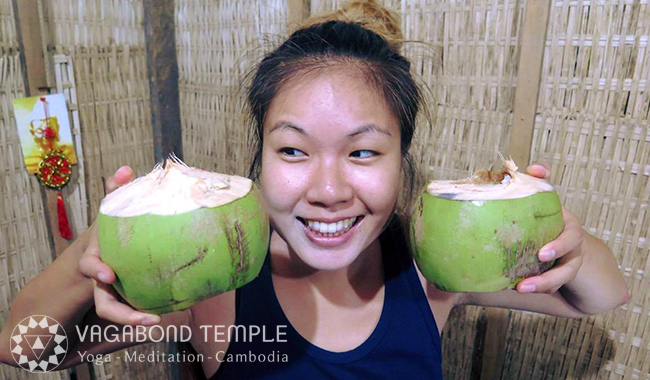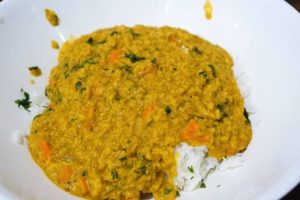A Beginner’s Guide to Detox

For Alice Chan, the prospect of going without food for five days seemed impossible, if not altogether ludicrous. In this post, she explains how she fared on our Detox Cleanse Program and shares the invaluable wisdom she gained while fasting – a must-read for anyone curious about detox!
“Would you like to try a five day detox program, in which three of those days are fasting from food and only drinking coconut water?”
I imagine a lot of people would react to this offer with “Hmm, no thanks!” Before coming to Vagabond Temple, my personal reaction would have been to run screaming for the hills (or possibly to the nearest pizza place).
But I have now completed the five day detox program and I can safely say it was not what I was expecting. At all.
I have a somewhat obsessive and emotional relationship with food – I constantly need and crave satisfaction from eating. I eat when I’m hungry, I eat when I’m not hungry, I eat when I’m happy, sad, confused, stressed and everything in between. I get anxious when I’m out eating with friends and the waiter takes too long to take our order. The moment I’ve finished eating, I start speculating about my next meal. I get serious anxiety in situations that restrict my access to food (see: long flights and voluntary fasting!)
So although I was up for the challenge, I entered the detox program with a real sense of trepidation.
And I won’t deny that the experience was a rollercoaster of sensations and emotions. I confronted my intense anxiety of not having instant access to food whenever I feel like it. I learned that my stomach won’t, in fact, start eating itself if I miss a meal. I practiced calming my mind and letting go of negative thoughts instead of immediately turning to food for comfort as well as dealing with physical hunger and fatigue. There were low moments where I just wanted to give up, but during my darkest hours the close-knit detox group and wider Vagabond Temple community lifted my spirits by listening to me vent and cheering me on.
Soon enough, the program was over and I had managed – to my complete surprise – to emerge not only unscathed, but glowing, happy, charged full of energy and immensely proud. After all, if anyone had been voted Least Likely To Survive Detox, it would have been me. Which is why I am now uniquely qualified to pass on my advice to other first-time detoxers, who are anxious or sceptical about going without food for five days.
1. Understand what is happening to your body
Knowledge and understanding of what is happening to your body during detox is essential.
The first revelation that altered my mindset going into the detox program is that: detox is not a torture, it is not starvation or deprivation – it is giving our bodies a rest.
According to the ancient healing system known as Ayurveda, detox allows our digestive system to take a break and enables the body to accelerate its own natural healing process. Our digestive system is constantly working hard and using up energy processing and breaking down three meals a day, sometimes more, plus all the snacks we may have in between. A meal takes on average 17 hours for our bodies to digest. Anyone who has ever had a “food coma” knows that the body can be overwhelmed by the sheer amount of food we ingest. We also accumulate toxins in our body by eating processed foods, preservatives, meat and dairy. These foods are particularly hard to digest and can leave us feeling bloated and lazy as our body struggles to process them. By fasting, we are free up energy, which the body then uses to eliminate toxins, strengthen the digestive system and rejuvenate itself.
Believe it or not, we can survive without food for days, even weeks. We have a surprising amount of reserves in our body that will continually supply us with energy to function. There is no need to worry – your body will not starve whilst you fast.
2. Set the time and secure the environment
Define the length of your detox and stick to it. This way you will have a clear start and end date and won’t be tempted to end early or not start at all. Worrying about when you will eat again can create unnecessary anxiety, which interferes with the detox process. For the same reason, it’s important to ensure that you detox in a supportive and encouraging environment. The last thing you need is people around you tempting you with food or acting like you’ve gone crazy! Detoxing with a friend, or even a group of friends, will give you some much needed morale support.
Even with morale support, you’re likely to experience all sorts of moods and physical states: tiredness and frustration were the most common one for me. Fasting often brings up supressed emotions or even physical illnesses from your past. Other members of my group experienced difficulty sleeping, vivid dreams and extreme sensitivity to noise and stimulation. So make sure you give yourself a break! Take time off work and refrain from doing anything strenuous. Remind yourself why you’re doing this. Know that your body isn’t starving. And then go and do something relaxing and fun!
3. Mind over matter
It’s easier said than done when your stomach is growling with hunger or when you’re feeling depleted of energy, but the challenge of detox is far more mental than physical. Initially, I made the mistake of treating detox like a torture that I had to endure. The program started to feel like my own personal prison. I let myself be overwhelmed by recurring thoughts: “I miss food, I would give my right arm for a chocolate fudge brownie, I can smell food cooking, I’m so hungry, why must I suffer like this!?” This led to feelings of intense frustration, especially because some of my fellow detoxers seemed to be relaxed and happy, glowing with extra energy. How could they find it so easy? Why weren’t they as miserable as I was!?
As with many difficult things in life, bringing meditation and mindfulness to your experience makes a world of difference – I found I was able to let go of those negative feelings through this approach. Go somewhere quiet where you can focus on just you, close your eyes and examine your thoughts. Instead of getting involved in them, stand back and observe. Don’t judge yourself or be harsh on yourself – you are in the middle of a detox, of course you are feeling a whole range of sensations and emotions. Witness them and then let them go.
Every time I saw food, it triggered an auto response of “I want that” and I learned to slowly see food as just an object, something I’ve experienced before – I know what it tastes like and I don’t need it right now. After a while I didn’t yearn after food, real or imaginary, because I knew food would still be there waiting for me at the end of the fast. Despite all my anxiety, I found a way to be at peace without food.
4. Mindfulness is for life, not just for detox
The most important set of insights I will take from this experience and apply to daily life is not just what I eat, but how I eat.
Before the detox program, I never ate in a mindful way. Even while I was eating a delicious meal, I was always focused on something else; the dessert menu, my friend’s plate, a TV show, a deep conversation, an urgent work email. Fasting for five days really gave me distance and perspective on my own eating habits: I realized I was barely enjoying the food I crave so much in daily life because my mind was too busy elsewhere.
As part of the program at Vagabond Temple, I learned many techniques for eating mindfully: chew food thoroughly, eat at a moderate pace, sit down and take time over your meals. These tips seem so obvious, but I’ve found that a few simple changes in how I eat can help prevent overeating, bloating and feelings of guilt and shame about food. Above all, food should be satisfying and we should enjoy our meals – so don’t restrict yourself too heavily. Eating mindfully and nutritiously is much better for our health and happiness than counting calories or crashing up and down on fad diets. Once we apply this, we won’t be constantly hopping between guilt or stress of what we eat or being over-analytical of food decisions ruling our lives.
We all finished this detox with massive smiles on our faces, radiant and feeling very grateful in our own ways, but the week was indeed a journey.
You may not find detoxing as physically demanding and mentally challenging as I did. Detoxing in a group made me realize that everyone’s process is unique and we all had highs and lows at different times. The common thing we were all surprised about was that we didn’t feel nearly as hungry as we thought we would! There were pangs at certain times in the day but on the whole I was satisfied with coconut water and hunger doesn’t increase as time went on as you would expect.
One thing is for certain: I got much more than just digestive health benefits out of the detox. In fact, it was as much an emotional detox as a physical one. The program has permanently changed my relationship with food and given me a real insight into what my body needs – as opposed to what I think it needs. I am now kinder and gentler in my thoughts around food and, in turn, more mindful in my eating habits. The way our bodies work hard to process everything we put through it on a daily basis is truly incredible – the least we can do is give it a well-deserved rest from time to time!
Learn more about our online spring detox
Read Alice’s Beginner’s Guide to Yoga.




